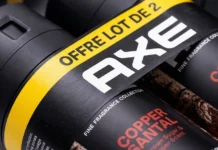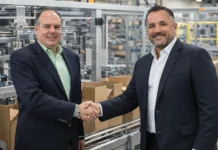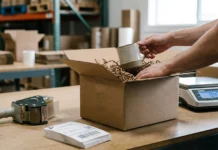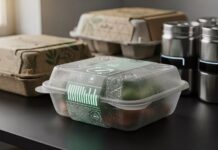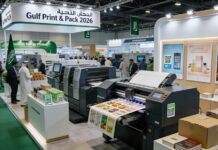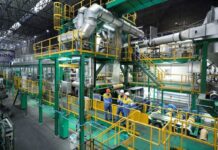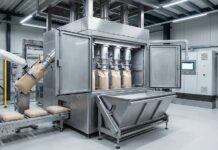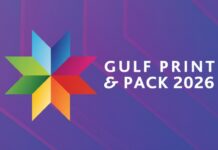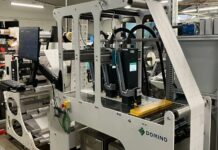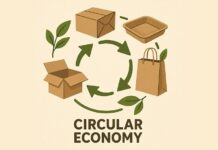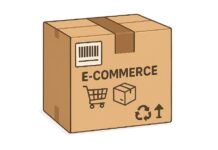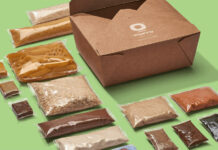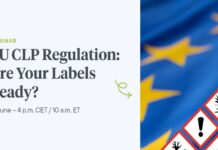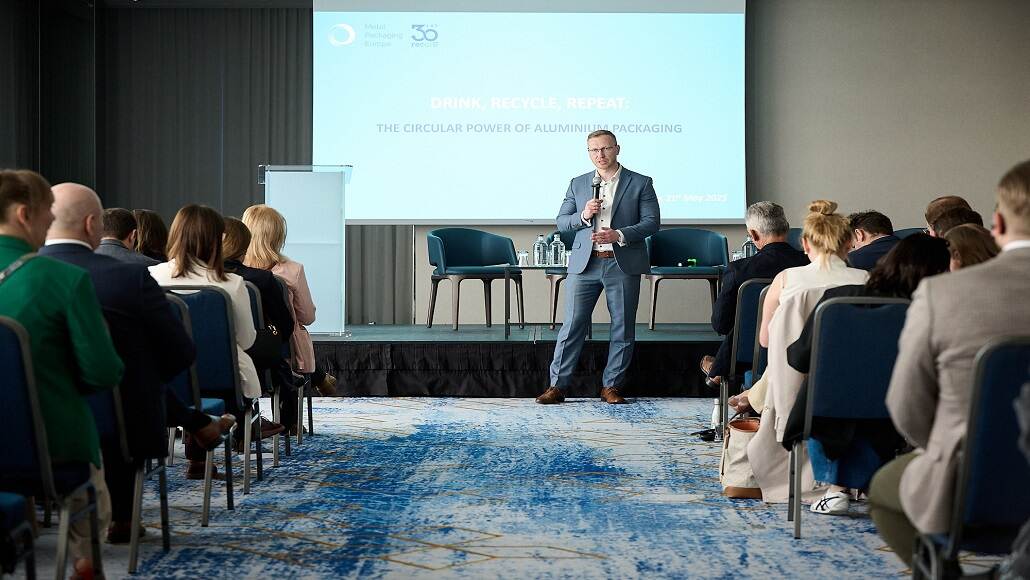On May 21, 2025, Warsaw became the center of a key discussion for the European aluminium packaging management industry. Over 70 experts and representatives of the sector met to discuss the impact of the EU’s PPWR (Packaging and Packaging Waste Regulation) on the future of packaging made of this metal. The conference participants agreed that the new regulations will significantly change the market throughout the European Union, requiring companies to adapt to new standards and waste management principles. Is the sector ready for the upcoming challenges?
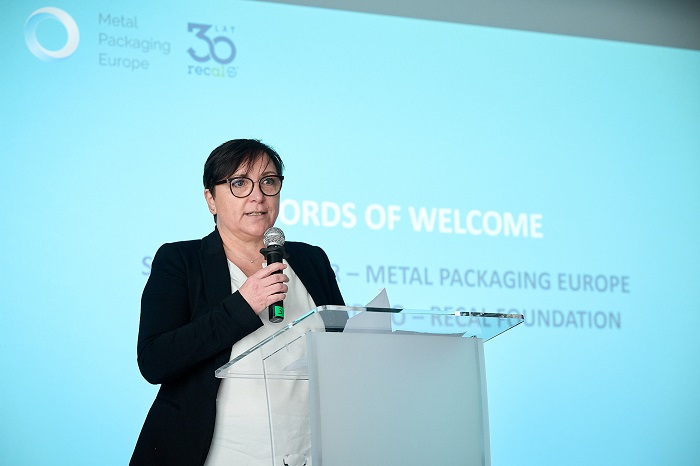
The conference “Drink. Recycle. Repeat. Circular Power of Aluminium Packaging” was opened by Sarah Cuvellier – Deputy CEO of Metal Packaging Europe, who stressed the importance of cooperation of all supply chain stakeholders related to the production and recycling of aluminium packaging in the context of the new EU PPWR regulation: “Several months have passed since the adoption of the PPWR, but the packaging industry has not stopped discussing it. The discussion is the drafting of the numerous implementing acts, the development and publication of which will determine the final shape of changes to the packaging market regulated by PPWR.”
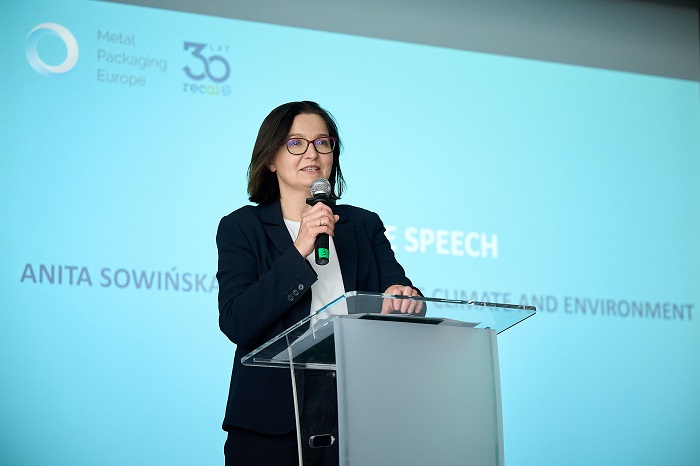
During the meeting, Anita Sowińska, Deputy Minister of Climate and Environment, emphasized the value of aluminum: “As some of you already know, aluminum is my favorite raw material. I am a supporter of systemic solutions, and aluminum fits perfectly into the circular economy. It is also appreciated by manufacturers in many areas of the economy – in construction, transport, production of electrical and electronic equipment, the furniture industry and, of course, in the production of packaging. This popularity of aluminum, and even competition for resources, undoubtedly proves that this raw material has many advantages: lightness, corrosion resistance, plasticity, good thermal and electrical conductivity and a relatively low price. But what additionally distinguishes aluminum from other raw materials, such as plastics, is that it can be recycled an infinite number of times without losing quality, which makes it a strategic material for circular transformation.”
The representative of the ministry also referred to the packaging design and improving the efficiency of aluminum recycling. In her opinion, there are many possibilities, and the most important legal tool supporting eco-design is PPWR packaging regulation: “Its goal is for all packaging placed on the market to be recyclable from 2030. Recycling performance will be expressed in performance grades A, B or C and will be assessed on the basis of design criteria, such as ease of dismantling, ease of emptying the packaging, presence of additives that may interfere with recycling, method of removing the label, material composition or packaging closures used. After 2030, packaging will be considered recyclable if the recyclability performance grade is at least 70%, and packaging that does not meet this criterion will be withdrawn and replaced with other solutions. However, from 2035, a new factor will be added to the assessment of the packaging recyclability which is the recycled-at-scale assessment. Therefore, an assessment will be carried out based on the quantity (weight) of the material effectively recycled from each of the packaging categories.”
At the same time, the deputy minister reminded that PPWR regulation enters into force directly and does not require transposition into the laws of the Member States. However, it must be adapted to national conditions: “Already designing the extended producer responsibility system for packaging, we take into account the packaging groups, as well as recycling efficiency classes indicated in PPWR regulation, so that all this is consistent.” – added Anita Sowińska, Undersecretary of State in the Ministry of Climate and Environment.
About PPWR from the perspective of the supply chain
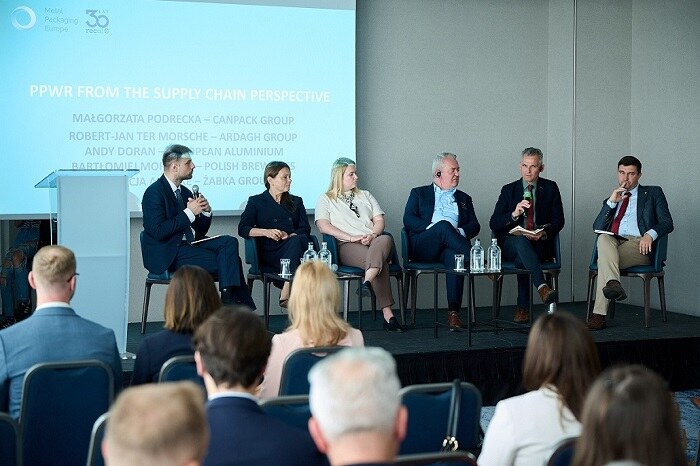
The next point of the event was a discussion session with the participation of supply chain stakeholders related to the production and recycling of aluminium packaging. The guests of the panel included:
– Małgorzata Podrecka – Vice President, CANPACK Group
– Patrycja Aremke – Head of the Environmental Protection Team, Żabka Group
– Bartłomiej Morzycki – General Director, The Union of Brewing Industry Employers – Polish Breweries
– Robert-Jan ter Morsche – Governmental Affairs Director Europe, Ardagh Group
– Andy Doran – Director Packaging Group, European Aluminium
During the discussion, the participants agreed that PPWR regulation is generally a good solution, although it is not possible to regulate all aspects unequivocally due to the specificity of individual markets. In their statements, they shared initiatives already implemented as part of preparations for the new regulations. The key issues included the deposit-refund system, extended producer responsibility and consumer education, which play an important role in adapting the market to the upcoming changes.
Małgorzata Podrecka reminded that aluminium beverage cans are undisputed leader of circular economy, and their recycling level in the EU, Great Britain, Switzerland, Norway and Iceland was 75% in 2022, while in Poland it reached a level of 80%. “Such excellent recycling of beverage cans compared to other packaging requires reflection on part of the legislator about role of packaging made from permanent materials, which of course includes aluminium. In particular, this concerns the exclusion of aluminium packaging from PPWR requirements for refilling, because cans are not suitable for this by definition, but their recycling fully meets the assumptions of circular economy.” – specified Małgorzata Podrecka, representing the CANPACK Group.
In his statement, Robert-Jan ter Morsche, on behalf of Ardagh Group, underlined: “One of the requirements of PPWR for all Member States is to achieve a collection rate of 90% for beverage cans and PET bottles up to 3 liters by 2029. If this is not met, the country must implement a deposit system for this packaging. This is what the new regulations say about it.”
“In our opinion, one-way glass should remain outside the deposit system, but collection targets for packaging glass must be set at 90% – the same as for deposit-based packaging, i.e. metal cans and plastic beverage bottles.” – added Robert-Jan ter Morsche – Government Affairs Director Europe, Ardagh Group.
Andy Doran, on behalf of European Aluminium, strongly underlined role of aluminium remelters that also produce sheet for production of new cans: “European producers of aluminium sheet coils are also recyclers of aluminium beverage cans. PPWR introduces the concept of “recycling at scale” and “recycling classes”, but a full understanding of the meaning of these words requires, in the case of “recycling classes”, the adoption of implementing regulations, the assumptions of which are not yet known.” said Andy Doran, representing the Packaging Group at European Aluminium.
Bartłomiej Morzycki – General Director of the Union of Brewing Industry Employers – Polish Breweries, drew attention to the high position of beverage can in the so-called “packaging mix” of the beer industry: “As a brewing industry, we have been consciously approaching the issue of managing our products and packaging of these products for years, including by expanding their portfolio. Thanks to this, we are well prepared for new regulations. At the moment, 40% of beer packaging on Polish market is returnable packaging. Aluminium cans are gaining popularity and there is a systematic increase in their share in the packaging mix – for beer producers associated in the Association, this percentage currently exceeds 50%. Thus, we are closing the loop, both in the case of reusable packaging and cans” and underlined “What beer is sold in depends on consumers. The can is well perceived on the Polish market as convenient packaging. The deposit system can only help it. However, this requires intensive educational activities, and the initiatives implemented by RECAL Foundation respond to the needs of industry.”
The Golden Can Awards for the most deserving partners
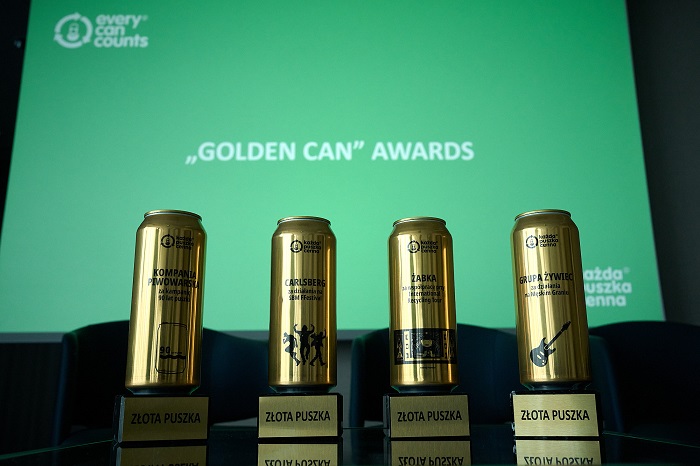
One of the key educational projects aimed at educating on the collection of aluminium packaging is the global initiative Every Can Counts (in Poland known as Każda Puszka Cenna), coordinated by the RECAL Foundation. During the event, ECC project director David Van Heuverswyn emphasized the importance of information and educational campaigns that shape pro-environmental attitudes and encourage responsible waste management. He pointed out that effective public education is the foundation for building a more sustainable future for aluminium packaging.
“Starting October 1, 2025, Poland will launch a nationwide deposit-refund system including aluminium drink cans. This scheme will almost certainly push return rates into the high 90% range. That’s a huge win for circular economy goals, and ECC welcomes it. Experts caution that “public education is another major challenge” and without awareness campaigns, many might only recycle when paid, and neglect all the other non-deposit waste or proper sorting. High collection rates don’t automatically build a culture of care about recycling.” – informed David Van Heuverswyn.
Every Can Counts owes its remarkable success to strong partnerships and collaborative efforts. The conference provided a perfect opportunity to recognize their contributions and present the “Golden Can” awards. This year’s awardees included Kompania Piwowarska, Grupa Żywiec, Carlsberg Polska, and Grupa Żabka. “The awards we presented today are a token of appreciation for the partners who have helped bring our initiative’s vision to life.” said Bartłomiej Wojdyło, Member of the Board at the RECAL Foundation and Chair of Every Can Counts. “We would like to thank Kompania Piwowarska for their ‘90 Years of the Can’ campaign, which focused on recycling and the upcoming deposit return system and Grupa Żywiec, who has been a long-standing partner during dozens of Męskie Granie concerts. Carlsberg Polska for campaign at the SBM Festival, where we combined recycling with street art. And Grupa Żabka who played a key role in delivering the International Recycling Tour. Each of these initiatives has made a tangible impact on raising recycling awareness in Polish society.” – summarized Wojdyło.
Summary of the event
In closing remarks, Sarah Cuvellier – Deputy CEO of Metal Packaging Europe pointed out: “Actual implementation of PPWR is an undertaking, the effects of which will be visible for next years. From today’s discussion, it is clear that Circular Economy requires taking into account the unique role of easy-to-recycle packaging made of permanent materials. PPWR is superimposed on the need to conduct educational campaigns, because the return of empty cans will take place in an uncrushed form. Initiatives such as Every Can Counts are complementary to the legislative framework as all actors in the aluminium packaging value chain, from the aluminium producer to the consumer, must work towards effective implementation of the circular economy.”




